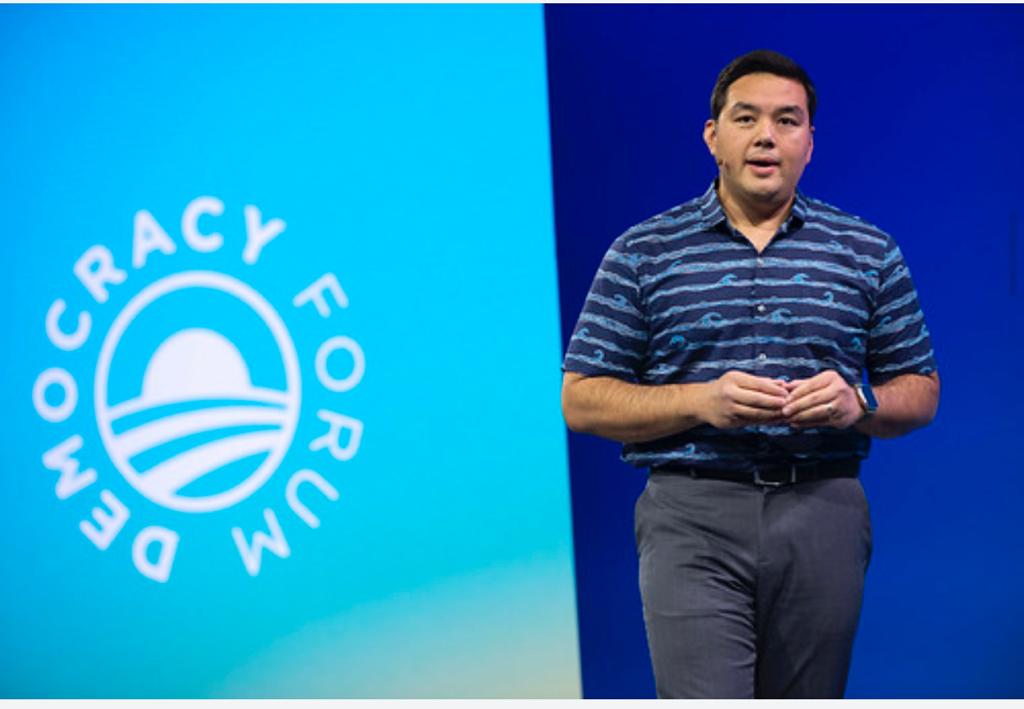Shelton speaks on island struggles and gains at Obama Foundation forum

Amidst the decline of democratic processes across the globe, how do marginalized communities climate-proof democracy? Austin Shelton, PhD, director of University of Guam Center for Island Sustainability and Sea Grant, joined changemakers in discussing this issue at a recent forum organized by the Obama Foundation.
The Foundation hosted its first Democracy Forum at the Javits Center in New York City on November 17, in partnership with Columbia University and the University of Chicago. The forum brought together emerging leaders from across Obama Foundation programs with leading experts and practitioners who are reimagining our institutions and strengthening democratic values across the globe.
Shelton spoke about Guam’s experience in “Lightning Talk: Democracy and Climate Change.” The segment featured subject matter experts and leaders who discussed their work in strengthening and expanding democracy across the globe.
According to Shelton, colonization interrupted the island’s sustainable existence by creating a dependence on an external power. But climate change has emerged as another external force that threatens the existence of communities and erodes island democracies.
“It (climate change) is an existential crisis across the whole planet but even more, it is a clear and present danger in the islands. Places that contribute the least impact to the causes of climate change now suffer its wrath. We experience rising sea levels, more frequent and intense storms, and warming waters that bleach and kill our coral reefs.”
He added: “As rising seas chew away on our shores; we lose our land. If islanders become climate migrants, or even climate refugees, what happens to our submerged lands? What happens to our sovereignty? If we are forced to move to somebody else’s higher land in a foreign place, what happens to our people?”
Shelton said climate change is eroding democracy and is also preventing the emergence of stronger democratic institutions. However, he added, while islands have struggles, islands are not powerless.
“That is why we are taking hope into action to end the interruption in our sustainable existence. We build on our legacy of ancient island wisdom, innovate on the present and navigate the waters to our sustainable future,” he emphasized.
As a multi-sectoral initiative, Guam Green Growth and its component programs will place the island back on the path of sustainability, according to Shelton.
For one, he said the G3 Circular Economy Makerspace and Innovation Hub is charting a pathway for the emerging green economy, as supported by the G3 Conservation Corps, a workforce development program focused on sustainable agriculture, aquaculture, renewable energy, and other areas. In addition, the island wide G3 community garden project continues to serve as beacons of food security and education.
At the forum, former US President Barack Obama said that since its inception, the Foundation’s mission has been to inspire, empower, and connect the next generation of change-makers. Now, the Foundation has a global network of leaders, not just in the United States but in Europe, Africa, Asia-Pacific region, and Latin America.
“I just have to say, the determination and the passion of these leaders, many of whom are here, are already making an impact, in lives saved, environments restored, children educated. Many of you are creating new models for clean energy restoration, new ways of thinking about poverty alleviation, and it is inspiring.”
Obama said that the Foundation will be launching a new and expanded Leaders USA program in the coming months that can help more young people put their idealism to work.

